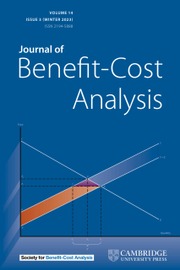Article contents
Publication Selection Biases in Stated Preference Estimates of the Value of a Statistical Life
Published online by Cambridge University Press: 17 December 2020
Abstract
This article presents the first meta-analysis documenting the extent of publication selection biases in stated preference estimates of the value of a statistical life (VSL). Stated preference studies fail to overcome the publication biases that affect much of the VSL literature. Such biases account for approximately 90% of the mean value of published VSL estimates in this subset of the literature. The bias is greatest for the largest estimates, possibly because the high-income labor market and stated preference estimates from the USA serve as an anchor for the VSL in other higher income countries. Estimates from lower-income countries exhibit less bias but remain unreliable for benefit-cost analysis. Unlike labor market estimates of the VSL, there is no evidence that any subsample of VSL estimates is free of significant publication selection biases. Although stated preference studies often provide the most readily accessible country-specific VSL estimates, a preferable approach to monetizing mortality risk benefits is to draw on income-adjusted estimates from labor market studies in the USA that use Census of Fatal Occupational Injuries risk data. These estimates lack publication selection effects as well as the limitations that are endemic to stated preference methods.
- Type
- Article
- Information
- Copyright
- © The Author(s), 2020. Published by Cambridge University Press on behalf of the Society for Benefit-Cost Analysis
References
- 8
- Cited by


